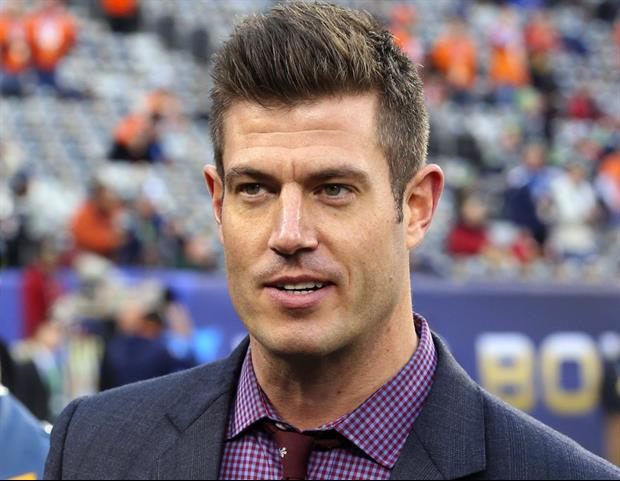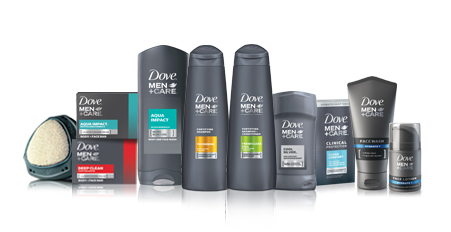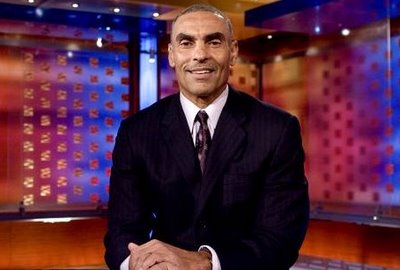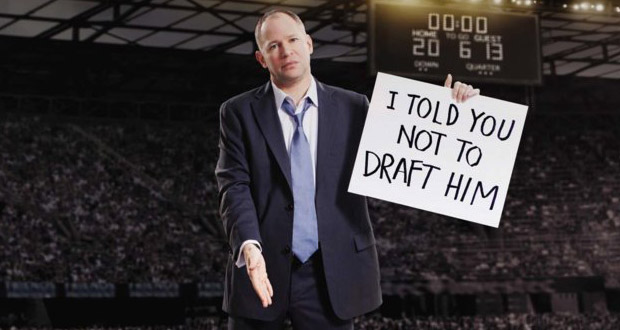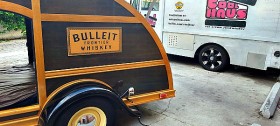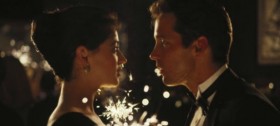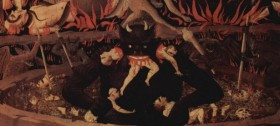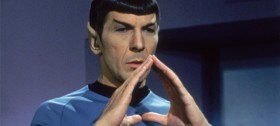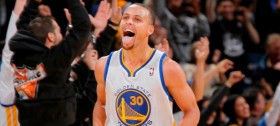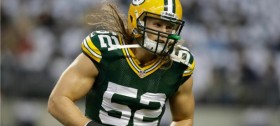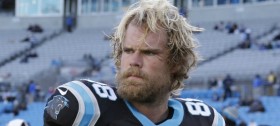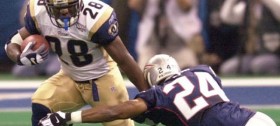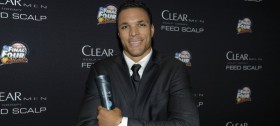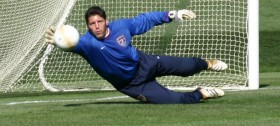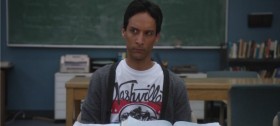Posts tagged ESPN

Jesse Palmer Talks Football And Tells Us How We Can Take Pride in Our Pregame
This fall, Jesse Palmer has teamed up with Unilever men’s brands to help guys take pride in their everyday grooming routines. As a former player and current top color commentator on the new SEC Network, Jesse Palmer knows all about pregame routines both on and off the field.
Calling the most marquee games in some of the biggest stadiums in the country this season, Jesse’s pregame routine is essential to his success, and he relies on a variety of Unilever products to the get the job done, such as Dove Men+Care body wash and Degree deodorant.
Whether it’s tailgating, face painting, or wearing a lucky shirt, college football Saturday is all about taking pride in pregame rituals. However, with all the support fans show for their teams on game day, it is just as important for men to develop strong everyday grooming habits with similar enthusiasm.
“As a former player and current analyst, taking pride in my pregame both on and off the field has been crucial to my success,” Jesse Palmer says, “what sports fans may not know is that my grooming routine is essential for my pregame preparation before a big broadcast too.”
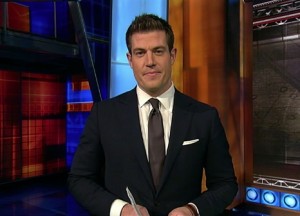 By creating a simplified, one-stop shopping experience where men can find all of their grooming product needs in one place, the partnership is yet another example of how Unilever is revolutionizing the way men shop. Look for the products as well as grooming habits in stores throughout college football season.
By creating a simplified, one-stop shopping experience where men can find all of their grooming product needs in one place, the partnership is yet another example of how Unilever is revolutionizing the way men shop. Look for the products as well as grooming habits in stores throughout college football season.
I spoke with Jesse today on his work with Unilever, college football, his transition from college to the NFL, and more. Click here to listen to the interview!
For more info on Dove Men+Care Click Here! For Degree Click Here!
Nov 18th
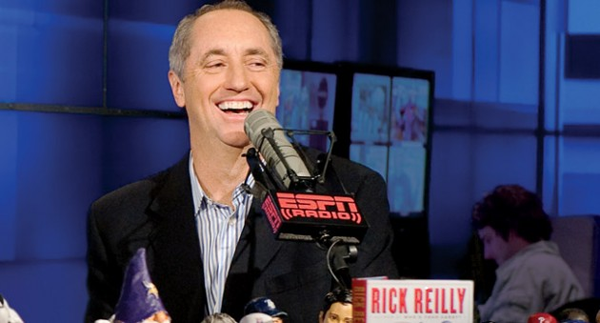
ESPN’s Rick Reilly Tells Us What To Expect From His New Book
Growing up in high school besides the text books and novels I had to read for school most of my reading material consisted of comic books. That was until I started reading Rick Reilly’s column in “Sports Illustrated.” Rick has a way of telling a story that perfectly intertwines sports and life. Rick has been voted NSSA National Sportswriter of the Year eleven times. He currently writes for ESPN, but will be stepping down from that role on July 1st.
On May 13 you can get his new book, “Tiger Meet My Sister: And Other Things I Probably Shouldn’t Have Said.” This book is a collection of his work that even has a postscript section after each story to let the reader know if anything has changed since he posted each story.
I had the pleasure to chat with Rick about his new book, how Muhammad Ali played many pranks on him, best and worst interviews, sports, and more.
Art Eddy: I am loving your latest book. The forward/obituary sections were amazing. I am guessing since you are a writer you may have written your obituary a few times right?
Rick Reilly: (Laughs.) When you have to write a weekly sports column, which I feel like I have been doing since I was 20, you just go through dozens and dozens of ideas every week. Sometimes they don’t work out. You kind of hide them. I have this file on my computer that has about 500 ideas. Out of those 500 ideas 300 of them have been started and then abandoned.
I have probably worked on my obituary about ten different times. I was thinking okay I got nothing else this week, so let me try the obituary. Finally I thought this would be the perfect forward because beginning July 1st I am giving up the sports column for 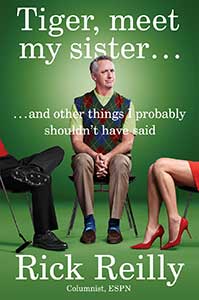 good. I am just going to write books. So I thought hell why not eliminate the middle man and write your own obituary. It was really fun. It was really fun to look back on your life and say it wasn’t that bad.
good. I am just going to write books. So I thought hell why not eliminate the middle man and write your own obituary. It was really fun. It was really fun to look back on your life and say it wasn’t that bad.
AE: The section where you talk about fortitude when small people act big was very inspiring. From all that you have seen which story will always stay with you?
RR: Over my career I have found that those are the stories that I like doing the best. When you write about small people doing big things and overcoming things. There was this kid I wrote about who refused to give up running for the cross country team. He was a high school kid. It took him 35 more minutes than his teammates because he had cerebral palsy. The right side of his body didn’t work. He kept falling. In cross country you are going over fields and streams.
His face was all scarred up from these falls. His parents begged him to quit. So did his coaches. He wouldn’t quit. Pretty soon his teammates would go out there and finish the race. Then they would go back a mile and a half and finish with him. Pretty soon the girl’s team started doing. Then the cheerleaders started doing it.
Then at the last meet that he ran the opposing teams did it. At the finish line it was a bunch of crying parents. That kind of column sticks with me. I would say that there are five of those in this book.
AE: You have a section in your book about how some of your articles got you into hot water. For those articles how do you make up your mind whether to publish a story or not?
RR: Truth. You try to tell the truth. Sometimes you fail and get it wrong. I think I have published over two million words in my 37 year writing career. So you are going to screw up. Especially if you are an idiot like me you are going to screw up a lot. So the times you regret the most is when you accidentally misquote someone. Or when you realize later when meet someone you didn’t paint the right picture of them.
Sometimes you get into hot water, but you would still do it again. I think of Sammy Sosa, who at the time around 1998, was saying that he couldn’t wait for drug testing. He couldn’t wait for steroid testing. He said, ‘I am going to show all you people 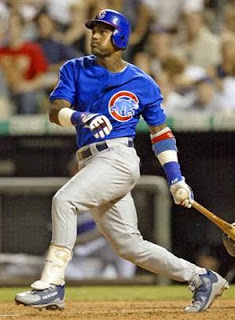 that my numbers are real.’
that my numbers are real.’
I said to him, ‘I found a drug testing lab ten minutes from Wrigley Field. You don’t have to wait for drug testing. Let’s do it now.’
He flipped out. He started screaming at me in Spanish. He started grabbing this baseball bat and threatening me. I was like hmm, someone doesn’t want to be tested. His point was about the (baseball players) union. It was sort of a mild post in a steroid story. He freaked out at the idea of being tested. As we know he did show up on a steroid failed test list. He shrunk by about 40 pounds as soon as he got out of baseball. His best friend was busted with 20 thousand dollars’ worth of steroids in the Dominican. I was in hot water for months over that, but I thought I was right.
AE: I have been a big fan of your work since I found your column in “Sports Illustrated.” Love the way you tell a story. How did you hone your craft as a storyteller?
RR: Thanks for saying that because I am 56 years old, but people come up to me like I invented the printing press. They will say, ‘I was 13 years old and that was the first reading I ever did. You taught me how to read.’
I am like come on. I am not “Dick meets Jane.” I was like you. The first really good reading I ever did was sports. It was a guy named Jim Murray. He was this great columnist for the “L.A. Times.” He wrote sentences that I have never seen before. They just jumped off the page and punched you in the nose. There were sentences and you would be like how did he do that?
I would read it over, over, and over again to see how he did it. It would be things like, ‘John Wooden is as square as a pan of fudge.’ Or things like, ‘Gentleman start your coffins.’ That is what he said once at the start of the Indy 500. This was a whole new way to write. That guy became my friend, my mentor, and my hero when I went to the “L.A. Times.” He said, ‘Make the writing 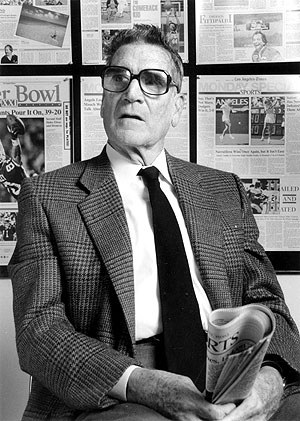 fun. There is no city ordinance. No one has to read you. They have got to want to read you.’
fun. There is no city ordinance. No one has to read you. They have got to want to read you.’
That was what stuck with me more than anything else. Make them want to read you. Make it fun. Don’t make it a job. That is how I tried to write from then on.
AE: Who has been the best person that you have interviewed and who has been the worst?
RR: Charles Barkley would be one through four. Then playing golf with Bill Clinton when he was the standing President was fascinating. I have never been around someone with that much charm, knowledge, and wit all wrapped in one. I know people think he is some kind of redneck hick, but this guy knew more about the world which I learned in four hours of golf. I thought he was really fascinating.
Another fascinating interview was with Mike Tyson. You didn’t know if you were going to get out of there with a punched eye or you were going to be his best friend or you were going to do crystal meth. You didn’t know if he was going to threaten you. You think anything could happen.
I always found him so fascinating because he was always so self-loathing. Yet in so many ways he was sort of an idiot savant. He knew more about Mao Tse-Tung and rebels in China and boxing, but he could hardly make his car payment.
So if you talk about most interesting interviews like Mohammad Ali when you would get him in the morning and he could still talk to you. He played tricks on you. One time he pretended to fall asleep during an interview with me. It was just me and him in this room. At that point I was like okay I guess I will just read this magazine. Two minutes later he dove across the couch and choked me. It was all a fake. So guys like that are things that I will never forget.
The worst. There have been so many bad interviews. Some people just start with a chip on their shoulder. Reggie Jackson started off that way. Sam Snead was terrible. What is funny is that some of these people who have never been interviewed are the worst. They say no comment. Dude you are really never going to be interviewed again so you better make a comment.
AE: Is there a person that you have tried to interview and to this day you are still trying to get?
RR: To this day and I can’t get him anymore was Johnny Unitas. The great quarterback would charge money for an interview. We weren’t ready to do it. Well I was ready to do it because I thought that alone was worth a column. That was a guy that I was never able to get. The companies that I worked for refused to do it. I can see why, but still. Wouldn’t it have been fascinating to interview Johnny Unitas and pay for the privilege?
AE: Recently you tweeted out that you are giving up your column at ESPN. How tough of a decision was that? 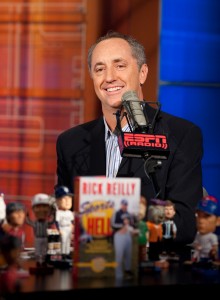
RR: Not tough. Not tough. I have been doing this for a living since I was 19 years old. It has always been sports. It has never been anything else. It is kind of like when a dog as an electric fence and finally the owner dies. The dog is like can I really leave this yard?
I could have left the yard about five years ago. I said okay I will go five more years and that is when I did this ESPN thing. I have been dying to try and write music, movies, politics, travel, and I want to do books. I have written 11 books. Three of them have been novels. I love the novels because the characters say stuff that you are laughing at the things that they are saying. And it is coming out of your fingers. So that is a really fun experience. We are going to live in Italy for six months. There is just a whole new life waiting out there for me. I am not dying. I am still going to write. I am certainly not going to write that much sports.
AE: Well maybe writing your obituary in this book might not have been the best thing since people might think you are dying.
RR: Yeah, they might really think that I am dead. A lot of them wish I were.
Apr 28th

ESPN’s Herm Edwards Tells MANjr. who he thinks will be playing in the Super Bowl
Fans of the NFL or ESPN know who Herman Edwards is. The former NFL player that made a name for himself with the Philadelphia Eagles also was a head coach for the New York Jets and Kansas City Chiefs. Edwards was the player who recovered a fumble by Giants quarterback Joe Pisarcik on a play that has been nicknamed “The Miracle at the Meadowlands.”
You can now catch Herm breaking down the NFL as an analyst for ESPN. Not only does Edwards still stay close to his passion by talking football, but he goes around the country to speak in front of large crowds. Whether he is speaking on a college campus or at a business convention, when he speaks people listen.
I had the great pleasure of talking with Herm about his time in the NFL as a player and as a head coach. Since I am a football fan I did ask him to breakdown this upcoming NFL season and tell me who he thought will be playing in the Super Bowl.
Art Eddy: First off let’s talk some NFL for this upcoming season. You do an outstanding job on ESPN. You are informative, funny, and to the point. So which teams do you think will have a great season?
Herman Edwards: This is a quarterback driven league. Yet I say that with some hesitation in the fact that this preseason right now there are a lot of injuries. There are some critical injuries too. Some guys that are going to lose some time especially when you think about Denver. They were the favorite going in this year to go to the Super Bowl.
The have lost some key components. When you lose (Von) Miller and (Elvis) Dumervil due to the fact that you didn’t get a contract done right and the other kid didn’t pass the drug test. Well now that is 30 sacks out of the building. That is not good. How do you replace that? Now their schedule will say that if they can get past the first six weeks, then they can make a run like they did last year. You still have to look at them as one of the favorites in the AFC.
New England I think is always going to be in the mix. I think that they are still good enough to win the AFC East. In the AFC North I think the favorite is Cincinnati. You look at the NFC West it is going to be between San Francisco and Seattle. I think Seattle is the team in the end that will be playing Denver in the Super Bowl.
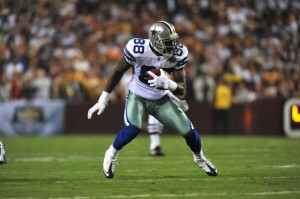 AE: Which team or player do you think will look to have a breakout year?
AE: Which team or player do you think will look to have a breakout year?
HE: I think Dez Bryant is maturing as a wide receiver. I really like him. I think he is going to have an outstanding year. I think the rookie down in Arizona, Tyrann Mathieu, I think he is going to make a bunch of big plays. We are going to be talking about him a lot on “SportsCenter.” He has instincts that you can’t teach. I like that in the guy. I watched him in college. I think that he is a guy that is always around the ball who can do something. It seems like every preseason game it is like he just made another play. If he can keep his life in order off the field he is going to be a very good football player.
A lot of people are saying that Andrew Luck will be having a down year. I don’t know that. I watched Andrew Luck in college. It didn’t surprise me that he had seven fourth quarter comebacks. It is going to be a fun year. There is always going to be a guy that explodes that comes on the scene. So we will just have to wait and see.
AE: Many Dallas Cowboys fans and fantasy football owners hope that you are right in that Dez Bryant will have a breakout year.
HE: Yea, especially for fantasy fans. They love touchdowns. (Laughs)
AE: I know your mantra is “Next man up.” There seems to be a lot of injuries this preseason. Which teams are going to feel the biggest brunt of the injury bug this year?
HE: Obviously you have to look at Denver. That is a team that is like whoa. You lost Miller and you already lost Dumervil. That is a problem. I think that when you look at the Pittsburgh Steelers they lost Le’Veon Bell. They were counting on him to run the football. Now he is gone along with Mike Wallace.
You look at the players on free agency that leave and you look at the players that go hurt and the offensive line in Pittsburgh that really struggled. Now you have the same scenario with Ben (Roethlisberger). He is running around trying to protect himself. When I watched Ben play against Washington it looked like the Ben of old. Running around trying to make plays. The offense didn’t look too different to me.
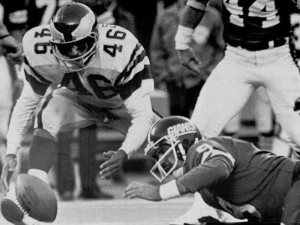 AE: This is where guys on the bench have their moment to step up. That happened to you as a player when you started out your career with the Philadelphia Eagles. What was it like to finally reach the top of the football mountain and be a starter in the NFL?
AE: This is where guys on the bench have their moment to step up. That happened to you as a player when you started out your career with the Philadelphia Eagles. What was it like to finally reach the top of the football mountain and be a starter in the NFL?
HE: When you are young you have these wild dreams. I think kids should always dream. Especially when I speak to young people I tell them we are very goal orientated. Your parents or your teachers say write down your goals. I tell them this. It is more than just writing down your goals. A goal without a plan is a wish.
You have to have a plan. When people tell me their goals, I say okay what is your plan? I had a plan to learn and to dedicate myself and to sacrifice myself. To make sure that if I didn’t make it as a pro football player I didn’t have any excuse. We sometimes reflect on our lives and use excuses for some of the situations we put ourselves in or not achieving the goal that we set out. You have to understand your talent level. Then you have to understand your passion.
I believe God gives everyone a talent. A lot of people are in search of that and they struggle. Then there is work involved in it and there is sacrifice. There is an old saying at the barbershop, ‘Everyone wants to go to Heaven, but no one wants to die.’ What are you willing to sacrifice to achieve that goal?
When I was young there were things that I was willing to sacrifice that other people didn’t want to do to be an athlete. So when I made it I was like okay how do you stay here? It is the same old story. You got to work. You have to roll up your sleeves and go to work. You have to want to get better. You can’t live on your laurels. There is a guy out there that is working just as hard. He is trying to take your job.
That is the one thing about pro football. You don’t graduate. Not like college. You have a graduating class in high school. You have a graduating class in college. In pro football you have to take somebody’s job. I think sometimes we don’t realize that the hardest competition is within. You have to learn how to compete against yourself. See I never competed against an opponent. I played right corner for ten years. It didn’t matter who the wide receiver was. It was about me competing against me. How much better can I compete against myself? That was always the driving force for me.
AE: I guess you already answered my next question which was, who was the toughest receiver you had to guard in the NFL? I guess you were your toughest challenge.
HE: People always ask that question. I say this. If you can play at the professional level, you are pretty good. You are one of the best players in the world. If you are a professional athlete you are the best. You are pretty good.
AE: You also moved up the ranks in coaching. You started in college and worked your way into the NFL. When did you realize you wanted to become a head coach?
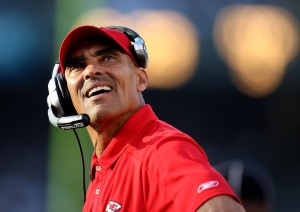 HE: I never wanted to become a head coach. (Laughs.)
HE: I never wanted to become a head coach. (Laughs.)
AE: Really?
HE: No, no. Not at all. That was never my goal to be quite honest. My goal after playing was to give back to football. It had given so much to me. I first got in as a scout. I think that helped me to become a coach. I was a scout for the Kansas City Chiefs for two years. I first went to college and coached at San Jose State. Then I left the college job and went to the Kansas City Chiefs and worked with Marty (Schottenheimer), Tony (Dungy), and Bill Cowher. There I learned how to scout.
I think that is so important about how you can learn about players when you scout. How to view players and how to evaluate players. You learn how to evaluate different positions, which I thought was great. Then from there I became a secondary coach. I was satisfied being a secondary coach. I had a group of guys that I enjoy coaching. Then I went with Tony to Tampa to be an assistant coach. Then after two years being there I got calls about becoming a coordinator. Tony said that I didn’t need to become a coordinator. You just sit here and be an assistant head coach and one day you will be head coach.
I said I didn’t want to be a head coach, but he said you will be a head coach. For Paul Tagliabue I was on his list. He gave me the privilege to some owner meetings with the GM’s and head coaches. It was almost like an interview process. I was the only assistant head coach that was at those meetings. I actually spoke at one of them. They were grooming me to be a head coach. I was on the fast track, but really had no intentions.
I had no ambitions of being a head coach. Why would you want that job? It is a thankless job. So sure enough these calls started coming in. I had five interviews. My first interview was with New York. A few days after the interview the Jets call me and say you need to come back up here. I asked why and they said if I wanted the job it was mine. So I said okay. (Laughs) You just sit there and say whoa. It was a lot of fun. I really appreciated the opportunity Woody Johnson gave me to become a head coach.
Sep 3rd

ESPN’s Matthew Berry talks about his new book “Fantasy Life”
If you are into fantasy baseball or football leagues you know the name Matthew Berry. The man dubbed “The Talented Mr. Roto” can be seen on ESPN or heard on podcasts everywhere breaking down who you need and should draft for your fantasy league.
This month Matthew released his book called “Fantasy Life.” Whether you are a fan of fantasy leagues or not this is a must read. There are stories in this book that will inspire you, make you cry, make you laugh, and reassure you that you are not as crazy as you thought. There are stories of people eating moths as a rite of passage to get into one league and in another league you must get a tattoo if you come in last place. See you and your league are not so crazy after all.
“Fantasy Life” is a great read. You find out where Matthew got his start in the entertainment field and at what age he started his journey into the fantasy sports world. Get the book here!
Matthew was able to chat with me about the book, working at ESPN, and he even gave me his top three players that you should draft for this year’s fantasy football league.
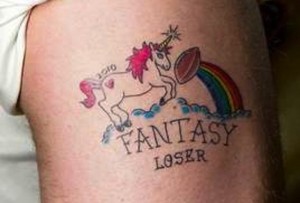 Art Eddy: Lot of questions I want to ask you, but let’s start out talking about your fantastic book “Fantasy Life.” Love all the stories that you share whether they are your own or if they are from other people like the tattoo league. When did you realize you wanted to write this book?
Art Eddy: Lot of questions I want to ask you, but let’s start out talking about your fantastic book “Fantasy Life.” Love all the stories that you share whether they are your own or if they are from other people like the tattoo league. When did you realize you wanted to write this book?
Matthew Berry: This is going to sound a little bit trite, but it is a two part answer. The trite part is I felt like I finally had a last chapter. Book starts off with me as a fourteen year old boy in my very first fantasy league. If you have ever read my columns you know that I always put in a personal story in every single column.
Every chapter has a personal story in my life starting when I was fourteen years old ending up at ESPN, married, and the birth of my daughter. So I felt like I finally had kind of a last chapter that the journey, not over, but completed. At least that particular journey. From point A to point B that coincided with the rise of fantasy sports in America.
The other thing was that I had so many stories that I wanted to do something with them. I didn’t have any place to put them. You mention the tattoo league. There are these guys in Omaha, Nebraska called the tattoo league. Go to YouTube and search “tattoo league” and you will see it. It is hilarious. The loser of this league has to get a tattoo chosen by the winner. It is unreal. There is a twenty five year old guy that is walking around Nebraska right now with a tattoo of Justin Bieber’s face. They sent me that. They have done this for three years now. I am like I got to do something with that. I got to put this in a book. I got to do something with this. So those were the two things.
AE: You started playing in fantasy leagues at the age of fourteen. There are a lot of mentions in your book where how leagues worked back in the day to now. Smartphones and tablets help people out these days. Are you a traditionalist or are you happy with all the great innovations there are now for the world of fantasy leagues? 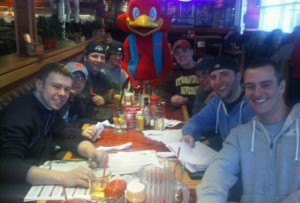
MB: To answer your question it is a little bit of both. Obviously I like the fact that I can play fantasy football on my phone or my iPad. The one thing that I am old school about is and is kind of disappointing is that thanks to all the great advances in technology you no longer have to be in the same room to draft. I think that it lessens the experience.
Drafting is such a great day and experience. It is so amazing. I got unbelievable draft stories in the book. Two hours before he is supposed to draft a guy gets called into work. Everyone is like this is the only time that we are together and the season starts tomorrow. He is like, ‘Dude, what do you want from me? I need this job. Somebody called in sick. They called me into work. I got to do it. I can’t lose this job.’
They are going to go to his work and do the draft while he is at work. The place where the guy was working was the Red Robin restaurant, where he was dressed as the Red Robin. Every ten minutes or so he would waddle over see what they picked. As he said it turns out a cheat sheet in taped inside my beak was not ideal. But he ended up getting it done.
You can do it online and you can do it from your phone, but that is a memory that they will always have. It was the most fun draft that they ever had in the history of this league. I got a picture in this book with nine guys and this guy in a big red bird costume. It is just one of those things where I think that I am old school in that you need to be in the same room to draft. I hate the online draft.
AE: Speaking of pictures in the book. How many times do you get a Napoleon Dynamite reference when people see that picture of you when you were fourteen? 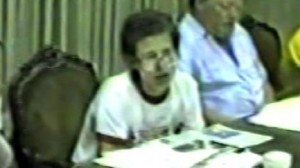
MB: Every time. I think that I have a lawsuit there. I got the big frizzy hair and the thick glasses. It was brutal. I absolutely have a lawsuit against Napoleon Dynamite.
AE: I am a big fan of fantasy leagues. I love being in them. Not only does being in a league make the NFL more interesting, but the relationships that are created and maintained is something you illustrate in your book. I love the story about BJ and his friends coming to visit him in the hospital. With all the stories you have seen it just goes to show the reader how strong a bond people have in these leagues right?
MB: Absolutely. They are an extended family. They are the people who you become closest to. I think that is one of the themes that is in the book. It is sort of what fantasy means. There are a lot of wacky hijinks obviously. There are crazy stories, but there are also stories about fantasy bringing people together. Families, husbands, wives. I talk about the league that I do with my wife, my kids, their friends, and their parents as well. Fantasy brings people together.
AE: How many texts do you get from your close friends for help with their fantasy team? Any sport worse than others?
MB: Maybe ten or fifteen, not a ton. Most have already emailed me earlier in the week. I get some panicked texts Sunday morning, but not a crazy amount. I get a couple thousand tweets. It’s insane. There is no lack of people trying to get advice one way or the other.
 AE: For people who are looking to get into fantasy leagues, is football the best sport to try first?
AE: For people who are looking to get into fantasy leagues, is football the best sport to try first?
MB: You should join a league with a sport that you love. If you are a baseball fan and not a football fan it makes a lot more sense to go there. In general you are right. (Football) is a shorter season. There are less players to know. In fantasy football it is mostly the stars that you are drafting. It is the quarterbacks, running backs, wide receivers. It’s a tight end. It is a team defense. So it is all name players.
Baseball and basketball go a little bit deeper. It is an easier barrier to enter. There is also a lot more people playing, so it is easier to find a league. I feel like everyone has a fantasy football league.
AE: You are a father and you say you do a few leagues with the family. Isn’t that a great way for a family to bond? Well unless you are Michael All who beat up his 66 year old dad over their fantasy league. When you saw that story did you question if that story was even real?
MB: Yea. I found it through news reports. It is one of those things where you say where did life go wrong? What happened on the path where you find yourself in a fantasy league with your father and then beating him up over payouts?
The thing that I love about that is can imagine you got to jail and you get your one call. The kid, his one call is like, ‘Hey mom, can you bail me out of jail? I kind of beat up dad.’ What the hell?
AE: Speaking of fatherhood your chapter on cheating is a good way to show your kids that cheaters never win. Just another great way fantasy leagues help us in life. Do you talk to your kids on cheating using your family’s fantasy league as an example?
MB: Well for us it is a very low stakes league. So no, we never had the opportunity. Something hasn’t come up where we needed to address it. I am the commissioner of the league. I run it with a strong firm hand. The kids have been raised right so they know in general cheating is wrong.
AE: Right now for fantasy football who are the top three guys in order you have going first, second, and third in this year’s draft?
MB: I think you have to go running back early this year. At the moment I have Adrian Peterson, Arian Foster, and Doug Martin.
Jul 24th
